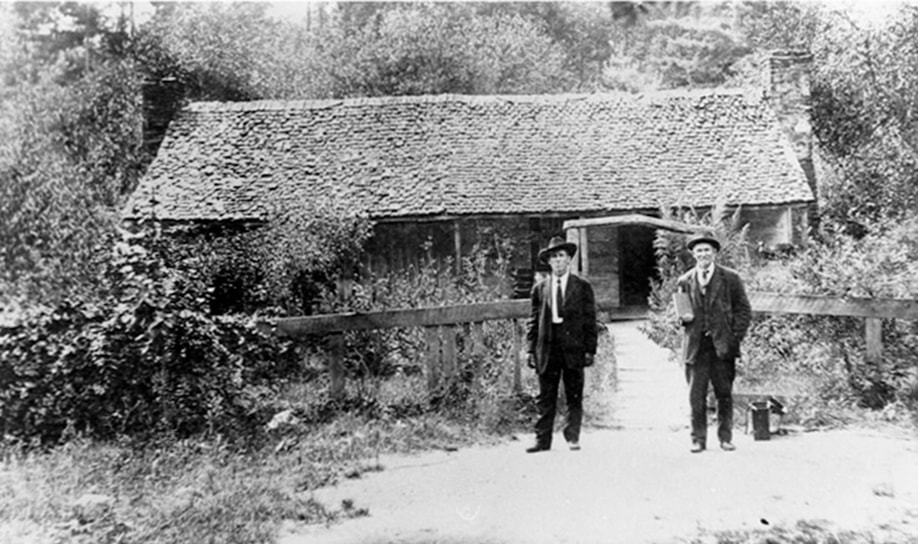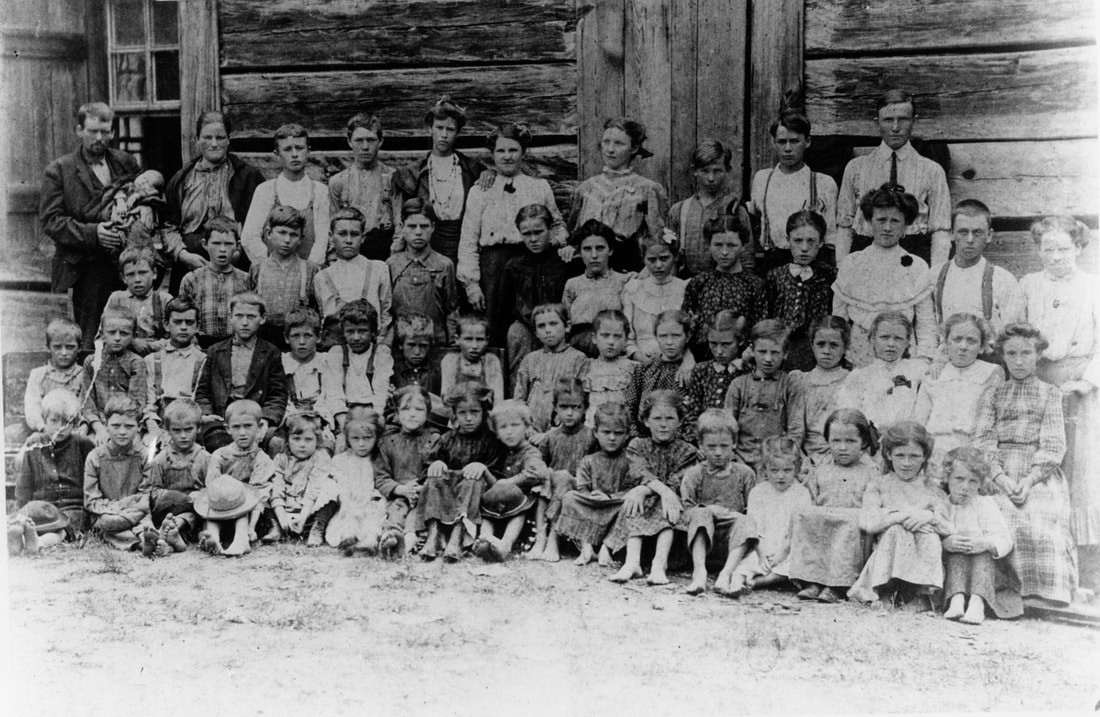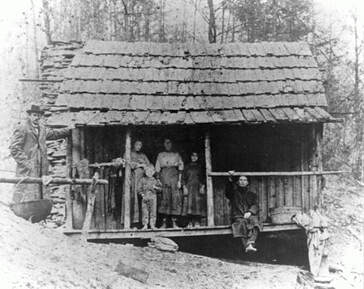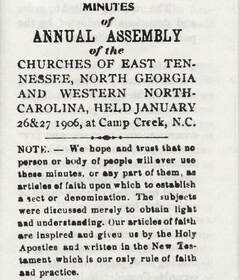OUR FIRST GENERAL ASSEMBLY
David G. Roebuck
|
TWENTY-ONE women and men gathered for our first General Assembly on Friday and Saturday, January 26 and 27, 1906, in the community of Camp Creek, North Carolina. Without good roads or an automobile, travel to the meeting was about a two-day journey for Pastor A.J. Tomlinson, who was coming fifty miles from Cleveland, Tennessee. Johnny Brown journeyed from Drygo, Tennessee, and his transportation included walking, a train ride to nearby Farner, and a wagon from Farner to Camp Creek. Nettie Bryant, who lived just over the hill from the meeting place, reportedly arrived by an ox-drawn cart.
In 1906, Tomlinson was serving as pastor of congregations in Drygo and Union Grove, Tennessee, as well as the Camp Creek church. He was also developing a mission in Cleveland that would be set in order in October. Other participants in the Assembly represented a congregation in Jones, Georgia, and the nearby Piney Grove church in Tennessee, which R.G. Spurling had established as a Christian Union in 1897. According to Tomlinson, who penned our earliest historical account in his book, The Last Great Conflict, the work of these churches had “so prospered that there began to be a demand for a general gathering together of members from all the churches to consider questions of importance and to search the Bible for additional light and knowledge.” Since none of the congregations owned a church building, they met in a home owned by Melissa Shearer Murphy. The Shearer family had provided the land for the nearby Shearer Schoolhouse, which was just a short walk from the Shearer-Murphy home. The Shearer schoolhouse had been the site of a great revival in 1896. During that revival, many were convinced of the doctrine of sanctification as a second work of grace. As a result that meeting and the revival spirit that continued, opponents expelled the holiness believers from their churches and forced them to meet in homes and roughly constructed log meeting houses. One of those places of worship was built not far from Melissa Murphy’s house on land donated by Miles Dickson Kilpatrick. In it the fires of revival burned brightly and the historical record reports that one after another fell under the power of God, and soon quite a number were speaking in other tongues as the Spirit gave them utterance. Some of the leading members of the community opposed their worship and doctrine of sanctification. Unwilling to burn a church house, in 1900, their opponents dismantled the makeshift building in order to burn the logs instead. This was such a flagrant act of persecution that charges were brought against 106 people. But the holiness believers asked the court to forgive the violators. William Franklin Bryant lived just a short distance southeast of the Shearer-Murphy home. He did his best to hold the holiness remnant together and finally heeded the advice of R.G. Spurling to organize a church. So, Spurling and R. Frank Porter organized the Holiness Church at Camp Creek in Bryant’s home in 1902. It was also in the Bryant home that Tomlinson became a covenanted member on June 13, 1903. Indiana-born Tomlinson was a home missionary to the mountain people and had recently settled in nearby Culberson, North Carolina. By 1903, the Holiness Church already knew and trusted him, so they selected him as pastor of the Camp Creek congregation. Pastor Tomlinson moderated and served as clerk of the first Assembly. After he called the delegates to order and conducted devotions, their first action was to adopt a motto: “We do not consider ourselves a legislative or executive body, but judicial only.” By this they meant that it was not the purpose of their Assembly to make God’s laws or to implement God’s laws; but rather, God’s laws are revealed in the New Testament, interpreted by the Assembly, and implemented by local congregations. Delegates to the Assembly discussed various issues, came to a consensus, recommended their conclusions to the local churches, and agreed to meet again the next year. The winter weather was so cold that J.C. Murphy had to continually put logs on the fire to keep the delegates warm. Before they left for their respective homes that Saturday evening, a fierce snowstorm made their fellowship seem all the warmer and the world all the more challenging. Pastor Tomlinson reflected in his journal, “The meeting on the whole was noticeable of the love to one another and the unity….” |
“It seemeth good to the Holy Ghost and us, being assembled together with one accord, with the Spirit of Christ in the midst, and after much prayer, discussion, searching the Scriptures and counsel, to recommend these necessary things and that they be ratified and observed by all the local churches.” —First General Assembly |
|
The People Who Met
We do not know why those particular twenty-one people attended. Some lived nearby, and others were their most trusted leaders. But, we do know that they were people of purpose, passion, pragmatism, and providence. They were people of purpose in that they had a reason to get together. Those first Assembly delegates did not envision their work as organizing a human institution; they had searched the Scriptures, and in the example of the Jerusalem Council in Acts 15, they were confident that they had biblical precedent for their actions. There were questions to answer, problems to solve, and a world to win for Jesus Christ. So, they came to this meeting to search the Scriptures, to find God’s will, and to work together. These delegates were also people with passion—a passion for unity, for understanding God’s Word, and for the harvest. Evangelism burned in their hearts. It was during their discussion of evangelism that we read some of the most powerful and memorable language of that Assembly. Following their initial discussion, they tarried for a time of consecration and “consideration of the ripened fields and open doors for evangelism.” In response to a God-given vision of the harvest, “strong men wept and said they were not only willing but really anxious to go.” With tears in their eyes, delegates committed “to press into every open door . . . and work with greater zeal and energy for the spread of the glorious gospel of the Son of God than ever before.” Their passion to win the lost pervaded other discussions as well. One of their reasons for shunning the use of tobacco was that the money saved by giving up the habit could better be used to spread the gospel. And, they saw the establishing of Sunday schools in unreached areas as a means of beginning new churches. Although they had great ideas, their idealism did not get in the way of down-to-earth pragmatism. An example is seen in their recommendation for prayer meetings. The delegates agreed that a person “led by the Holy Spirit or selected by the church” should be responsible. Clearly they preferred for someone led by the Spirit to oversee prayer meetings; but if such a person could not be found, prayer meetings were still necessary and, so the church should select a leader. Their pragmatism is also evident in their discussion of the use of tobacco. Although they did not have a biblical chapter and verse prohibiting tobacco, they knew there were good reasons to abstain from its use. They noted that tobacco is offensive, weakens the nervous system, is a relative of drunkenness, is a bad influence and example for the young, and wastes money that could better be used to clothe the poor, spread the gospel, and improve their homes. Finally, they simply could not believe that Jesus would use tobacco. They encouraged a pastoral approach to those bound by the habit, but they also recognized the power of accountability and called for the deacons to report those who had been delivered from its use. Finally, they were people of providence in that they were continually looking for God to be at work among them. They expected to be led by the Spirit, and they expected new light as they searched the Scriptures. Their concluding decision was to meet again the next year “as the providences of God and His Spirit may direct.” When their business was completed, they evoked the language of the Jerusalem Council in Acts 15: 25 with an affirmation of spiritual discernment and unity. They concluded, “It seemeth good to the Holy Ghost and us, being assembled together with one accord, with the Spirit of Christ in the midst, and after much prayer, discussion, searching the Scriptures and counsel, to recommend these necessary things and that they be ratified and observed by all the local churches.” |
TOPICS OF THE FIRST ASSEMBLY
• Assembly Is Judicial Only • Assembly Record Keeping • Local Church Record Keeping • Communion and Footwashing • Prayer Meetings • Evangelism • Use of Tobacco • Family Worship • Sunday School • Letter of Recommendation • Annual Assembly |
Significance of the Assembly
Our first Assembly was far more significant than simply a memorable date on the calendar. Particularly important is the model the first Assembly set for our decision making. It introduced a process that raised questions, searched the Scriptures, and sought the will of God. It recognized the importance of respecting others’ voices, even when they differed, and trusted that God would speak to the Assembly through those voices. Representatives of local congregations trusted that in the body there would be discernment and wisdom, and all were subject and accountable to one another.
The first Assembly also revealed a commitment to work collectively to fulfill the Great Commission. Rather than going it alone, those first delegates agreed to enter the harvest together. This commitment to cooperation would later include other important ministries such as publications, education, and preserving our heritage.
Finally, the first Assembly brought together two truths: (1) That while we continually seek to be led by the Holy Spirit, the Word of God is foundational in all that we do; and (2) We must expect the Holy Spirit not only to intervene in miraculous ways but also to illuminate the Word and direct us as we apply the Word to the world in which we live and the congregations we serve.
Our first Assembly was far more significant than simply a memorable date on the calendar. Particularly important is the model the first Assembly set for our decision making. It introduced a process that raised questions, searched the Scriptures, and sought the will of God. It recognized the importance of respecting others’ voices, even when they differed, and trusted that God would speak to the Assembly through those voices. Representatives of local congregations trusted that in the body there would be discernment and wisdom, and all were subject and accountable to one another.
The first Assembly also revealed a commitment to work collectively to fulfill the Great Commission. Rather than going it alone, those first delegates agreed to enter the harvest together. This commitment to cooperation would later include other important ministries such as publications, education, and preserving our heritage.
Finally, the first Assembly brought together two truths: (1) That while we continually seek to be led by the Holy Spirit, the Word of God is foundational in all that we do; and (2) We must expect the Holy Spirit not only to intervene in miraculous ways but also to illuminate the Word and direct us as we apply the Word to the world in which we live and the congregations we serve.
|
|
THE SHEARER-MURPHY HOME
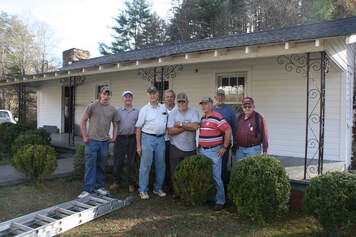 In 2009, a Church of God Men of Action group provided
In 2009, a Church of God Men of Action group provided a new roof to help preserve the First Assembly House.
With no other facilities available to the Holiness Churches, J.C. and Melissa Murphy agreed to host the first Assembly in their mountain home. Melissa Murphy actually owned the home, which she had inherited from her first husband—First name Shearer. The house was located at the edge of a forest with evergreen pine trees highlighting an otherwise barren winter landscape.
Delegates transformed the front room of the rustic house into a meeting place by moving the normal furniture to another room and replacing it with chairs lined in rows, facing a rough pulpit. Because of the chilling winds and falling snow, J.C. Murphy kept logs burning in the fireplace. Small children slept on feather mattresses and quilts in another part of the house.
Other church members prepared meals for the delegates during the two-day meeting. Pastor Tomlinson later remembered that “good Sister Murphy cooked and served the entire Assembly.” Nettie Bryant also helped cook, and children carried water from the natural springs flowing nearby. Most of the delegates boarded in the homes of other church members scattered along the mountainside.
Today, the Shearer-Murphy House is maintained by the Church of God of Prophecy as a historical landmark. The Church of God provides a monthly stipend for its care, and Church of God Men and Women of Action assist when called upon. The home is located on River Hill Road not far from Fields of the Wood, which is 18 miles west of Murphy, North Carolina, on NC-294.
Delegates transformed the front room of the rustic house into a meeting place by moving the normal furniture to another room and replacing it with chairs lined in rows, facing a rough pulpit. Because of the chilling winds and falling snow, J.C. Murphy kept logs burning in the fireplace. Small children slept on feather mattresses and quilts in another part of the house.
Other church members prepared meals for the delegates during the two-day meeting. Pastor Tomlinson later remembered that “good Sister Murphy cooked and served the entire Assembly.” Nettie Bryant also helped cook, and children carried water from the natural springs flowing nearby. Most of the delegates boarded in the homes of other church members scattered along the mountainside.
Today, the Shearer-Murphy House is maintained by the Church of God of Prophecy as a historical landmark. The Church of God provides a monthly stipend for its care, and Church of God Men and Women of Action assist when called upon. The home is located on River Hill Road not far from Fields of the Wood, which is 18 miles west of Murphy, North Carolina, on NC-294.
Epilogue
Although the Assembly was held near the location of the movement’s origins, Tomlinson’s new home in Cleveland, Tennessee, represented the future of the Church of God movement. When he relocated to Cleveland in 1904, the town was the thriving seat of government of Bradley County where he already was experiencing significant ministerial success. It also had good opportunities for employment, good schools for his children, and a north-south railroad line that made extensive ministry travel possible. The second Assembly would be held at the Union Grove Church in Bradley County. With that Assembly would come a name change and an expansion of the role of the General Assembly.
Although the Assembly was held near the location of the movement’s origins, Tomlinson’s new home in Cleveland, Tennessee, represented the future of the Church of God movement. When he relocated to Cleveland in 1904, the town was the thriving seat of government of Bradley County where he already was experiencing significant ministerial success. It also had good opportunities for employment, good schools for his children, and a north-south railroad line that made extensive ministry travel possible. The second Assembly would be held at the Union Grove Church in Bradley County. With that Assembly would come a name change and an expansion of the role of the General Assembly.
MINUTES
of
ANNUAL ASSEMBLY
of the
CHURCHES OF EAST TENNESSEE, NORTH GEORGIA AND
WESTERN NORTH CAROLINA, HELD JANUARY 26 & 27 1906,
at Camp Creek, N.C.
NOTE. – We hope and trust that no person or body of people will ever use these minutes, or any part of them, as articles of faith upon which to establish a sect or denomination. The subjects were discussed merely to obtain light and understanding. Our articles of faith are inspired and given us by the Holy Apostles and written in the New Testament which is our only rule of faith and practice.
of
ANNUAL ASSEMBLY
of the
CHURCHES OF EAST TENNESSEE, NORTH GEORGIA AND
WESTERN NORTH CAROLINA, HELD JANUARY 26 & 27 1906,
at Camp Creek, N.C.
NOTE. – We hope and trust that no person or body of people will ever use these minutes, or any part of them, as articles of faith upon which to establish a sect or denomination. The subjects were discussed merely to obtain light and understanding. Our articles of faith are inspired and given us by the Holy Apostles and written in the New Testament which is our only rule of faith and practice.
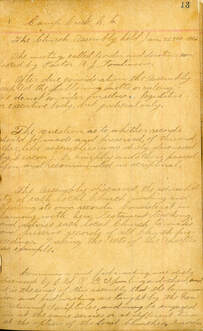 First Page of 1906 Minutes
First Page of 1906 Minutes
The meeting called to order and devotions conducted by the pastor, A. J. Tomlinson.
After due consideration the Assembly accepted the following motto or ruling: We do not consider ourselves a legislative or executive body, but judicial only.
The question as to whether records should be made and preserved, of this and other like assemblies was duly discussed by deacon J. C. Murphy and others, passed upon and recommended as scriptural.
The assembly discussed the advisability of each local church making and preserving its own records. Consider it in harmony with New Testament teaching, and advise each local church to make and preserve records of all church proceedings. The Acts of the Apostles as example.
Communion and feet-washing were duly discussed by elder R. G. Spurling and others, and it is the sense of this assembly that the communion and feet-washing are taught by the New Testament Scriptures, and may be engaged in at the same service or at different times at the option of the local churches. In order to preserve the unity of the body, and to obey the sacred Word, we recommend that every member engage in these sacred services. We further recommend that these holy ordinances be observed one or more times each year.
Prayer-meetings discussed by brother Alexander Hamby and others. It is, therefore, the sense of this assembly that we recommend, advise and urge that each local church hold a prayer-meeting at lease once a week. We recommend further that some one in every church, who may feel led by the Holy Spirit or selected by the church, take the oversight thereof and see that such prayer-meeting is held regularly and in proper order.
Evangelism, discussed by the pastor and others; reports of work done the past year; consecration on the part of a number. After the consideration of the ripened fields and open doors for evangelism this year, strong men wept and said they were not only willing but really anxious to go. It is, therefore, the sense of this meeting that we do our best to press into every open door this year and work with greater zeal and energy for the spread of the glorious gospel of the Son of God than ever before.
A discourse on The Use of Tobacco was delivered by evangelist M. S. Lemons and discussed by others. After due consideration this assembly agrees to stand, with one accord, in opposition to the use of tobacco in any form. It is offensive to those who do not use it; weakens and impairs the nervous system; it is a near relative to drunkenness; bad influence and example to the young; useless expense, the money for which ought to be used to clothe the poor, spread the gospel or make the homes of our country more comfortable; and last we believe its use to be contrary to the teaching of Scripture, and as Christ is our example we cannot believe that He would use it in any form or under circumstances.
We further recommend and advise that the ministers and deacons of each church make special effort to use their influence against its use, deal tenderly and lovingly with those in the church who use it, but insist with an affectionate spirit that its use be discontinued as much as possible. We also, advise the deacons to secure a report at the close of each year, of the number that have been induced to discontinue the habit and delivered from a desire for it, also the number that still continue its use, and carry such report to the general assembly.
After due consideration the Assembly accepted the following motto or ruling: We do not consider ourselves a legislative or executive body, but judicial only.
The question as to whether records should be made and preserved, of this and other like assemblies was duly discussed by deacon J. C. Murphy and others, passed upon and recommended as scriptural.
The assembly discussed the advisability of each local church making and preserving its own records. Consider it in harmony with New Testament teaching, and advise each local church to make and preserve records of all church proceedings. The Acts of the Apostles as example.
Communion and feet-washing were duly discussed by elder R. G. Spurling and others, and it is the sense of this assembly that the communion and feet-washing are taught by the New Testament Scriptures, and may be engaged in at the same service or at different times at the option of the local churches. In order to preserve the unity of the body, and to obey the sacred Word, we recommend that every member engage in these sacred services. We further recommend that these holy ordinances be observed one or more times each year.
Prayer-meetings discussed by brother Alexander Hamby and others. It is, therefore, the sense of this assembly that we recommend, advise and urge that each local church hold a prayer-meeting at lease once a week. We recommend further that some one in every church, who may feel led by the Holy Spirit or selected by the church, take the oversight thereof and see that such prayer-meeting is held regularly and in proper order.
Evangelism, discussed by the pastor and others; reports of work done the past year; consecration on the part of a number. After the consideration of the ripened fields and open doors for evangelism this year, strong men wept and said they were not only willing but really anxious to go. It is, therefore, the sense of this meeting that we do our best to press into every open door this year and work with greater zeal and energy for the spread of the glorious gospel of the Son of God than ever before.
A discourse on The Use of Tobacco was delivered by evangelist M. S. Lemons and discussed by others. After due consideration this assembly agrees to stand, with one accord, in opposition to the use of tobacco in any form. It is offensive to those who do not use it; weakens and impairs the nervous system; it is a near relative to drunkenness; bad influence and example to the young; useless expense, the money for which ought to be used to clothe the poor, spread the gospel or make the homes of our country more comfortable; and last we believe its use to be contrary to the teaching of Scripture, and as Christ is our example we cannot believe that He would use it in any form or under circumstances.
We further recommend and advise that the ministers and deacons of each church make special effort to use their influence against its use, deal tenderly and lovingly with those in the church who use it, but insist with an affectionate spirit that its use be discontinued as much as possible. We also, advise the deacons to secure a report at the close of each year, of the number that have been induced to discontinue the habit and delivered from a desire for it, also the number that still continue its use, and carry such report to the general assembly.
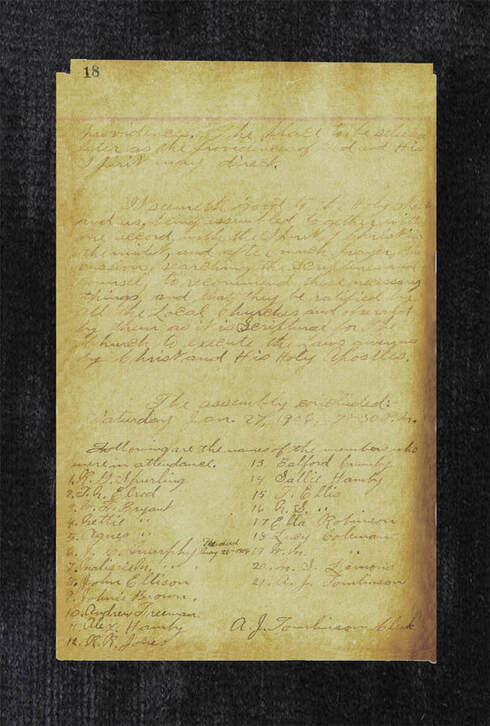 Having served in the roles of moderator and clerk, Pastor
Having served in the roles of moderator and clerk, Pastor Tomlinson’s handwritten minutes of the first General Assembly are
preserved at the Dixon Pentecostal Research Center.
Family worship was discussed by Andrew Freeman and others. It is, therefore, the sense of this assembly that we recommend and urge that the families of all the churches engage in this very sacred and important service at least once a day and at a time most convenient to the household and that the parents should see that every child is taught, as early as possible, to reverence God and their parents by listening quietly and attentively to the reading of God’s Word and getting down on their knees during the prayer. We recommend further that the ministers and deacons of each church use their influence and make special effort to encourage every family in the church to engage in this devotional exercise every day. And that the deacons ascertain the proper information and make a report of the number of families that have been induced to take up this service during the year, the number that make it a regular practice and those that do not and carry such report to the yearly or general assembly.
The Sunday School was briefly discussed by elder W. F. Bryant, Malissie Murphy and others. We highly favor this important service as a means to teach the children to reverence God’s Word and the house appointed for worship, and also, to elevate the morals of a community. It is, therefore, the sense of this assembly to recommend, advise and urge every local church to have a Sunday School every Sunday during the whole year if possible. We advise the workers to do all they can to propagate the Sunday School interests, and search for places where there are none and organize where it is possible to do so. We believe a Sunday School may sometimes be organized and run successfully where a church could not be established at once, thereby opening and paving the way for more permanent work in the future. It is further recommended that Sunday School be held in the forenoon when it is possible to hold them at that time.
When a member in good standing removes from the vicinity of one church to another, we recommend that a letter of recommendation be given them on request, in harmony with Romans 18:1, 2. “We commend unto you Phebe our sister, who is a servant of the church which is at Cenchrea that ye receive her in the Lord as becometh saints.”
We recommend a closer union and fellowship of all the churches. We, therefore, conclude an assembly composed of elders and chosen men, and the women, from each church, once each year to be of vast importance for the promotion of the gospel of Christ and His Church. We, therefore, with one accord select and set apart Thursday, Friday and Saturday before the second Sunday in January of each year, for this special yearly assembly. Provided, however, that there are no preventing providences. The place to be selected later as the providences of God and His Spirit may direct.
It seemeth good to the Holy Ghost and us, being assembled together with one accord, with the Spirit of Christ in the midst, and after much prayer, discussion, searching the Scriptures and counsel, to recommend these necessary things and that they be ratified and observed by all the local churches. It is the duty of The Church to execute the laws given us by Christ through His Holy Apostles.
The Assembly concluded: ─ Saturday, January 27, 1906, at 7:30 P.M.
Family worship was discussed by Andrew Freeman and others. It is, therefore, the sense of this assembly that we recommend and urge that the families of all the churches engage in this very sacred and important service at least once a day and at a time most convenient to the household and that the parents should see that every child is taught, as early as possible, to reverence God and their parents by listening quietly and attentively to the reading of God’s Word and getting down on their knees during the prayer. We recommend further that the ministers and deacons of each church use their influence and make special effort to encourage every family in the church to engage in this devotional exercise every day. And that the deacons ascertain the proper information and make a report of the number of families that have been induced to take up this service during the year, the number that make it a regular practice and those that do not and carry such report to the yearly or general assembly.
The Sunday School was briefly discussed by elder W. F. Bryant, Malissie Murphy and others. We highly favor this important service as a means to teach the children to reverence God’s Word and the house appointed for worship, and also, to elevate the morals of a community. It is, therefore, the sense of this assembly to recommend, advise and urge every local church to have a Sunday School every Sunday during the whole year if possible. We advise the workers to do all they can to propagate the Sunday School interests, and search for places where there are none and organize where it is possible to do so. We believe a Sunday School may sometimes be organized and run successfully where a church could not be established at once, thereby opening and paving the way for more permanent work in the future. It is further recommended that Sunday School be held in the forenoon when it is possible to hold them at that time.
When a member in good standing removes from the vicinity of one church to another, we recommend that a letter of recommendation be given them on request, in harmony with Romans 18:1, 2. “We commend unto you Phebe our sister, who is a servant of the church which is at Cenchrea that ye receive her in the Lord as becometh saints.”
We recommend a closer union and fellowship of all the churches. We, therefore, conclude an assembly composed of elders and chosen men, and the women, from each church, once each year to be of vast importance for the promotion of the gospel of Christ and His Church. We, therefore, with one accord select and set apart Thursday, Friday and Saturday before the second Sunday in January of each year, for this special yearly assembly. Provided, however, that there are no preventing providences. The place to be selected later as the providences of God and His Spirit may direct.
It seemeth good to the Holy Ghost and us, being assembled together with one accord, with the Spirit of Christ in the midst, and after much prayer, discussion, searching the Scriptures and counsel, to recommend these necessary things and that they be ratified and observed by all the local churches. It is the duty of The Church to execute the laws given us by Christ through His Holy Apostles.
The Assembly concluded: ─ Saturday, January 27, 1906, at 7:30 P.M.
David G. Roebuck, Ph.D. is director of the Dixon Pentecostal Research Center, Church of God Historian,
and Assistant Professor of the History of Christianity at Lee University.
and Assistant Professor of the History of Christianity at Lee University.

